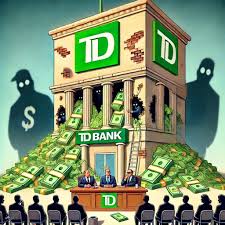TD Bank Agrees to Pay Over $3 Billion for Systemic Violations of Bank Secrecy Act and Money Laundering Violations (Part I of IV)

In addition to the financial settlement, TD Bank US Holding Company (TDBUSH) (together with TDBNA, TD Bank) and TDBNA entered guilty pleas to criminal offenses. TDBUSH pleaded guilty to causing TDBNA to fail to maintain an AML program that complies with the BSA and to fail to file accurate Currency Transaction Reports (“CTRs”). TDBNA pleaded guilty to conspiring to fail to maintain an anti-money laundering (AML) program that complies with the BSA, fail to file accurate CTRs, and launder money.
TD Bank earned the ignominious record: TD Bank is the largest bank in U.S. history to plead guilty to Bank Secrecy Act program failures, and the first US bank in history to plead guilty to conspiracy to commit money laundering.
As part of the plea agreement, TD Bank has agreed to forfeit $452,432,302.00 and pay a criminal fine of $1,434,513,478.40, for a total financial penalty of $1,886,945,780.40. TD Bank has also agreed to retain an independent compliance monitor for three years and to remediate and enhance its AML compliance program. TD Bank has separately reached agreements with the FRB, OCC, and FinCEN, and the Justice Department will credit $123.5 million of the forfeiture toward the FRB’s resolution.

Applying the Corporate Enforcement Policy factors, the Justice Department reached its resolution with TD Bank based on a number of factors, including the nature, seriousness, and pervasiveness of the offenses, as a result of which TD Bank became the bank of choice for multiple money laundering organizations and criminal actors and processed hundreds of millions of dollars in money laundering transactions. Although TD Bank did not voluntarily disclose its wrongdoing, it received partial credit for its strong cooperation with the Department’s investigation and the ongoing remediation of its AML program. TD Bank did not receive full credit for its cooperation because it failed to timely escalate relevant AML concerns to the Department during the investigation. Accordingly, the total criminal penalty reflects a 20% reduction based on the bank’s partial cooperation and remediation.
TD Bank’s resolution included coordinated regulatory resolutions with the Board of Governors of the Federal Reserve Board (FRB), as well as the Treasury Department’s Office of the Comptroller of the Currency (OCC) and Financial Crimes Enforcement Network (FinCEN).
The Federal Reserve Board fined TD Bank $123.5 million for violations related to anti-money laundering laws. The Board is also requiring TD to implement enhanced measures to comply with anti-money laundering laws and to correct its risk management deficiencies.

FinCEN assessed a record $1.3 billion penalty against TD Bank for violations of the BSA. FinCEN’s $1.3 billion settlement is the largest penalty against a depository institution in U.S. Treasury and FinCEN history. FinCEN’s action also imposes a four-year independent monitorship to oversee TD Bank’s required remediation.
The OCC issued a cease and desist order and agreed to a $450 million civil money penalty against TD Bank for BSA and AML compliance deficiencies. The OCC also imposed a restriction on the growth of the bank and a measure designed to ensure that the bank invests sufficient resources to remediate its BSA/AML deficiencies in a timely manner.















